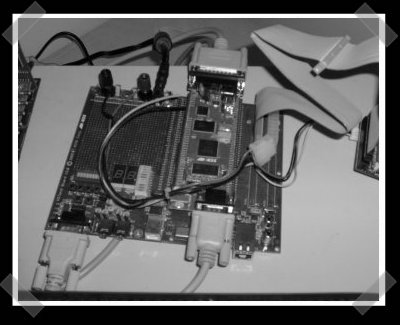
I was doing some project window shopping today, and FPGA’s came up on my list. [John Kent] put together a pretty impressive documentation set. He’s written up some of his own projects, some how-to’s and linked plenty of good information for the budding FPGA programmer.
16 thoughts on “FPGAs Rock”
Leave a Reply
Please be kind and respectful to help make the comments section excellent. (Comment Policy)















Fantastic, just what I’ve been looking for!
Thanks!
Thanks! I’ve been looking into FPGA’s, but being a fulltime C++ programmer it all looks a bit daunting. This will certainly help!
I really need to get back to FPGA programming too. It has been some while.
Besides some other custom FPGA boards, I have the BurchED board and it was very useful to
me because of the easy to use headers. I could plug my creations to any position and made a script to adjust pin-mapping and create the VHDL entity for me.
At work, I tried the Xilinx Starter Kit. With the right connector and flatcable it was connected to an Atmega128+WizNET board. (addr/data & SPI bus)
Way to go John.
I’ve met John a couple of times and talked over various FPGA things.
Great to hear a familiar name right over in Australia.
that’s a home internet account’s included website. has anybody mirrored this, because it’s gonna go down. I’ve just started this stuff at uni actually. damn useful, but the VHDL model is a little weird to someone used to programing as opposed to description.
why should it go down?
Look at the last upsate
Page Last Updated 28/01/2008 01:23 AM
if you are scrared, copy paste in a word doc and you will have it for life!
I agree that FPGA’s rock and I am happy they are getting a bit more attention due to the awesome power they have.
However – I find that this FPGA page really talks more about implementing a CPU within an FPGA and writing C or ASM for that CPU. While this may be one thing you can do, it by no means actually exploits the inherent power within the FPGA. You are still writing sequential code to be executed within the FPGA instead of just buying the cheaper hardened silicon.
VHDL has inherent parallelism based on concurrent processes, but the biggest turn off is the strict typing of the language (If VHDL is too strict, you can try Verilog, but when it comes to building hardware, you may prefer to be as strict as possible). Once you’ve passed this obstacle and have a good understanding that what you implement goes into registers and look-up tables, it’s all very easy going.
I recommend searching for the “VHDL Cookbook” for a great primer on VHDL.
Lastly, it should be realized that there are two flavors of VHDL that you can target – VHDL for Synthesis (programming for FPGA’s and other programmable logic devices), and VHDL for Simulation (testing cases, assert statements, floating-point calculations, etc). Some things which are nice for simulation (time delays, large for loops that can’t be parallelized, etc) are NOT synthesizable constructs.
@giskard: VHDL has the same programming structure as Ada. If anyone has ever programmed in Ada, then writing VHDL is a natural extension.
wish i found this site last year when my 3rd year digital logic programming course required a knowledge of VHDL whilst not having any books in the library, or lessons on it.
Anyone tried these compilers?: http://en.wikipedia.org/wiki/C_to_HDL
I noticed Altium has a C-HDL feature, which allows you to write software for your main processor and then move certain functions to hardware. But I need to get an fpga first.
hey is altium any good? they’ve an incredible marketing department because it looks so damn sweet.. but it’s also 10k, which pretty much screams RoC. anyway, could i get my company to buy it? everybody here uses the xilinx software and synplicity and that common simulator.. i’d love to see it integrated with board level design.
surprised there’s no mention of the xport 2.0 fpga board for gameboy advance. you can do some fun stuff with an arm processor, spartan fpga, and 16mb ram on the gba platform. charmedlabs.com makes them.
altium is great, but this is coming from a guy who has only used eagle and traxmaker.
They have a lot of flash videos on their site, which will give you a good idea of the program.
Or I’m sure you can find a “demo” version of the software online.
FPGA’s are fun too ! I found this little site very instructive : http://www.fpga4fun.com/
it has a few complete projects which demonstrate the power of FPGA’s pretty accurately.
dear all friends
actually i have no comment here, i am trying to do program with FPGA, but i have no such FPGA, i just hope to get some information about how to write code to FPGA and execute it. if anyone provide some example, thanks a lot.
sincerely
Check out http://www.fpgacentral.com for lot of good resources on FPGAs. Also try http://www.fpgaseek.com it is a search engine for searching FPGA related information.
FPGAs rock post for thanx.